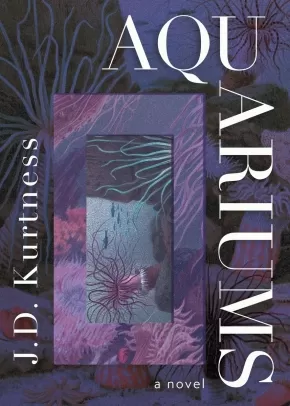Aquariums
Synopsis:
An intimate yet wide-sweeping story of a marine biologist working to save ocean ecosystems from climate change.
With the world’s oceans ravaged by climate change, Émeraude, a young marine biologist, works to preserve aquatic ecosystems by recreating them for zoos. When her work earns her a spot aboard a research vessel with an extended mission in the Arctic, it is the inescapable draw of the ocean that will save her when the world she leaves behind is irrevocably changed.
Stories of Émeraude’s ancestors — a young sailor abandoned at birth, a conjuror who mixes potions for her neighbours, a violent young man who hides in the woods to escape an even more violent war, and a talented young singer born to a mother who cannot speak — weave their way through her intimate reflections on a modest life, unknowingly shaped by those who came before.
Reviews
"Aquariums is a luminous, touching and comforting book, written with great clarity. In other words, a healing read. It can be read in a single sitting, and picked up again when one’s soul needs soothing." — Solaris
"J.D. Kurtness stands out on the indigenous literary scene for her unique style, inspired by dystopian and apocalyptic writing. In Aquariums, the author delivers a fragmented novel of filiation, mixing the different (non-)stories of a lineage and of the same generation, like an aquarium housing an ecosystem, to an apocalyptic end forcing a reset of the planetary population. Kurtness’s aesthetic is characterised by a holistic cosmic writing in which a sort of Glissant’s Tout-Monde is formed: the narratives of ancestors and the living communicate with the perceived and existing elements. This cosmic writing is conveyed through the fragmentary form, which is more organic than functional, the use of nature-related metaphors, that are tied to the life story of a whale, and the hybridity of the novel, which mixes the genres of life writing and dystopia. Although the author is Ilnu, the dimension of autochthony is not central to Aquariums. It is partially present in the discourse and the constellation of characters, but is not actively addressed." - Abstract from Dystopie, Fragmentation et Filiation dans Aquariums de J.D. Kurtness by Jody Danard
"This is a small book on a huge theme, set in various places and eras, featuring different perspectives. It could be confusing, but it works – so much so that I sometimes wished Kurtness had picked up some of her loose threads and developed the stories of Émeraude’s ancestors instead of returning to her protagonist’s journey. I want to know more about the scarred sailor, the blind shark, and the travelling whale. She dips her toe into the fantastical or the romantic and then pulls back, back to the science of a dying world. Aquariums is an inventive book on a grim not-so-distant future. In the end, Kurtness chooses to believe in the resilience of humanity. Like her ancestors before her, Émeraude will fight for her people’s future." - Roxane Hudon, Montreal Review of Books
Educator Information
Translated from French to English by Pablo Strauss
Additional Information
176 pages | 5.00" x 7.00" | Paperback

 Go
Back
Go
Back





